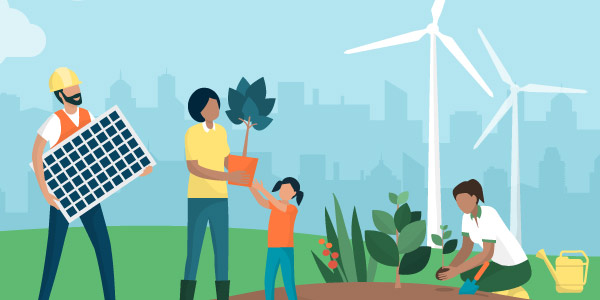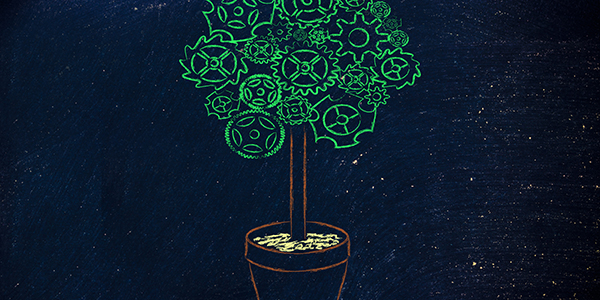Last updated on September 29, 2021
As Dallas College prepares for its 10th annual Sustainability Summit, Dr. Charles Hopkins has a message for us: The greening of our campuses is not enough to stem the current global sustainability crisis. Colleges and universities worldwide must begin locally with “a greening of the mind.”
If academia does its part now, the effect of getting all students to think about sustainability as a fruitful and profitable way of life could be planet-saving, he says.
Dr. Hopkins, the UNESCO chair in Reorienting Education Towards Sustainability at York University in Toronto, Canada, is the keynote speaker for next month’s “Resilience for the Next 50 Years” virtual summit. He is a leading proponent of embedding sustainability into the curricula and overall management of higher education institutions across the world.
Teaching the importance of protecting the environment and providing a socially just economy for future generations requires intergenerational thinking, he says. He references United Nations’ Sustainable Development Goal (UNSDG) 4: “Ensure inclusive and equitable quality education and promote lifelong learning opportunities for all.”
“To some people, making sure a sustainability mindset is embedded in our education might sound like indoctrination,” he adds. “But it’s really about clarifying our worldview.”
The last 50 years have been integral to Hopkins’ own worldview.
He has been involved with Education for Sustainable Development research on all continents and has advised ministries of education in Asia and Europe as well as universities and colleges in the Americas. He has been widely published and has lectured worldwide on a range of topics from quality education to educating for global citizenship and a sustainable future. Before assuming the UNESCO chair in 1999, Hopkins served as a teacher, principal, curriculum superintendent and regional superintendent with the Toronto Board of Education.
Speaking specifically about Texas, he says that, for all its size, the state can only do so much in the way of sustainability.
“As big as Texas is, it doesn’t set the price of oil,” he says. “The major issues that we have need to be faced in collaborative ways that make a difference as a whole. If Brazilian rainforests, for example, are the ‘lungs’ of the world, Texas needs to watch what it’s throwing into the air.”
At York University in Canada, a new university-wide academic plan prioritizes six areas to elevate York University’s contributions to the UNSDGs. These include implementing a whole-institution approach to sustainability and building a comprehensive sustainability strategy, using the SDGs as an anchor — much like Dallas College is doing.
“Each [geographical] area has its own issues, like DFW, but each of us needs to work on sustainability and localizing the SDGs, wherever we have the opportunity,” he says.
During the summit, Hopkins will address so-called “wicked issues” in the field of sustainability. Wicked issues are problems that are challenging to solve because they involve many interdependencies. Many social policy problems fall into this category because, unlike the problems of simple mathematics, they lack a clear solution.
All stakeholders must be engaged in order to find the best solution. This requires meetings in which issues and ideas are discussed and a common approach is formulated — a big reason why Dallas College hosts the Sustainability Summit every year.
“Higher education has the opportunity to take a place at the table,” Hopkins says. What role do we want to play? What role does Texas want to play amidst global threats of climate change, forced migration, economic injustice and the community college movement? What should you do?”
Sign up now for the Nov. 6, 2020 virtual Sustainability Summit “Resilience for the Next 50 Years.” Dr. Hopkins will be there — and he just might change the way you think about your everyday life.
Upcoming Events
Free Upcoming Sustainable U Events
- Oct. 13: Career Opportunities for Solving the Climate Crisis
- Oct. 20: Perennials You Can Count On
- Oct. 27: Grow Your Own Greens Inside Your Home: How to Get Started in Hydroponic Production for Beginners
Get Ready for the Sustainability Summit on Friday, Nov. 6
Amid a global pandemic and social turmoil, resilience is key to overcoming the challenges society currently faces. That’s why Dallas College believes it’s more important than ever to set the stage for conversations surrounding the pursuit of resiliency, sustainability and social justice for all.
For the 10th straight year, our college is proud to present the Sustainability Summit. This year’s free event takes place on Friday, Nov. 6, and is being hosted virtually by Dallas College Mountain View Campus. The Sustainability Summit is open to all and welcomes sustainability novices as well as professionals. Join Dallas College students and employees, community members, businesses, nonprofits and educators for discussions on identifying and delivering solutions to real-life challenges faced by individuals, employers and the community.
Dallas College is excited to welcome Charles Hopkins, UNESCO chair in Reorienting Education Towards Sustainability at York University in Toronto as this year’s keynote speaker. Explore what the summit has to offer and register for this free experience today.
For more information and to register, visit the Sustainable Dallas College Events website.

17 SDGs Cast a Common, Worldwide Vision for the Future
Five years ago, the United Nations created 17 Sustainable Development Goals (SDGs) to encourage holistic and positive change in the world. The SDGs outline integrated strategies that can improve health and education, reduce inequality and spur economic growth — all while tackling climate change and working to preserve our oceans and forests. The UN’s objective is to reach the targets outlined in the SDGs by 2030.
Within our own community, many organizations and individuals are already working to support one or more of these goals. At Dallas College, we’re striving to bring innovation, expertise, technology and financial resources to the pursuit of these goals. Achieving the SDGs requires everyone’s help!
Are you up for the challenge? Which goal will you commit to?

Use Your Thermostat To Save Energy and Money
Check out this video by the U.S. Department of Energy for great recommendations for saving energy with your thermostat.
